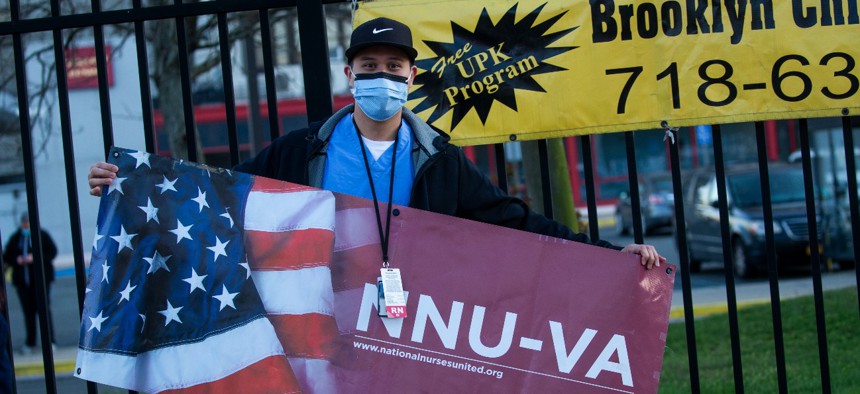
Nurses with the Brooklyn VA Medical Center hold a job action during a shift change on April 6, 2020 in the Brooklyn borough of New York City. Nurses in Brooklyn as well as other locations across the country are now holding rallies to bring attention to staffing shortages. Kena Betancur/Getty Images file photo
VA Nurses Stage Demonstrations to Protest Understaffing
Employees are taking on more work than ever, causing burn out and high turnover. VA hopes new pay authorities will reverse that trend.
Federal nurses scheduled protests at Veterans Affairs Department facilities around the country this week, seeking to raise concerns about understaffing in the face of VA taking on new patients.
The shortfalls are widespread and chronic, the nurses said, and the millions of veterans newly eligible for VA care after the passage of the Promise to Address Comprehensive Toxics (PACT) Act will exacerbate the issue. The law, which advocates and President Biden heralded as vital to ensuring veterans exposed to toxic burn pits while in the military get the care they deserve, also included sweeping investments in VA provider pay and incentives to address staffing needs. Nurses on the ground, however, said the situation is pressing and deserves immediate attention.
Dana Horton, a nurse at the Atlanta VA Medical Center, where employees, organized by National Nurses United, are scheduled to hold a rally on Thursday, said her facility has experienced an exodus of nurses recently.
“We’ve had a lot of turnover,” Horton told Government Executive. “Nurses were fed up and had moral distress. We want to provide the optimum care that we can. That’s what we as nurses do. But it’s difficult to do that when you don’t have the staffing you need.”
She explained the demonstration was meant to make management aware not just that they want more nurses brought on more quickly, but also that veterans are suffering.
“We want to spend time with the patients,” Horton said. “We want to get to know them. When you don't have enough staffing, you don’t get to know them.”
In July, the VA inspector general said the department saw staffing shortages spike in 2022 for the first time in five years. Nearly two-thirds of facilities reported insufficient practical nurse staffing, the most of any clinical position. A whopping 91% of facilities said they were experiencing shortfalls among nurses overall.
Irma Westmoreland, a nurse who will attend another demonstration on Thursday at the Charlie Norwood VA Medical Center in Augusta, Georgia, said before the COVID-19 pandemic her facility capped nurses at three patients per shift. That has since increased to five, officially, but management is still forcing nurses to take on as many as six or seven. The hospital, where Westmoreland has worked for 34 years, is also requiring overtime for some nurses, which she said causes them to miss cues and make mistakes.
“We’re going through it here,” she said, adding the shortages are creating “unsafe work environments.” Westmoreland noted her facility has lost 100 nurses since October and replaced just 50 of them.
Employees are moving to other hospitals in the area for higher pay and better work-life balance, she added. Westmoreland, through National Nurses United, is seeking more flexible scheduling practices to incentivize staff to stay in their jobs.
Other rallies are taking place in Tuscaloosa, Alabama, and Brooklyn, New York. Nurses are showing up before and after their shifts, as well as on their off days, to participate.
The IG noted in its report that VA’s struggles continued despite the department receiving direct hiring authority for nine positions in fiscal 2022, including for practical nurses. VA officials have lauded those authorities, calling them critical to maintaining adequate staffing during the pandemic and asking they be extended.
The PACT Act, which newly presumes that 23 respiratory illnesses are service connected, authorized leases for 31 new medical facilities at VA to help accommodate the expected surge in patients. The bill also authorized the department to buy out the contract of health care professionals to recruit them to VA, so long as they make a four-year commitment to the department. VA will have $40 million per year for the buyouts. VA’s health care employees will be eligible for pay boosts worth 50% of their base salaries, up from the current cap of 30%. Overall pay would be capped at level two of the Executive Service pay scale, which is currently $203,000 per year. VA Secretary Denis McDonough has called lifting the pay caps essential for VA’s recruiting and retention efforts and has aggressively pushed Congress to pass the reform.
Terrence Hayes, a VA spokesman, praised the department's nurses for delivering world-class health care, and promised VA would work with them and their unions to address their concerns.
“One of VA’s top priorities right now is recruiting, hiring, and retaining our great nurses,” Hayes said, adding the new authorities would support those efforts. “We have also maximized bonuses and retention incentives to reward VA nurses for their excellent work and keep them at VA, where they belong.”
James Young, another VA nurse, joined a rally at his facility in Brooklyn on Wednesday, saying he wanted to ensure management knew of the “crisis” he and his colleagues are facing. The nurses at the rally called on their administrators to ramp up recruiting efforts and increase the facility’s presence at job fairs. He stressed that veterans are receiving the care they require, but nurses do not have time to assist with other tasks such as connecting them with family or simply participating in conversation. Without allowing for those sort of engagements, he said, nurses will head for the exits.
“Patients will get the care,” Young said, “but we don’t want nurses to get burnt out.”







